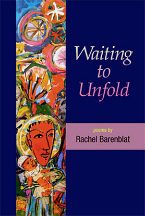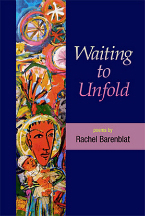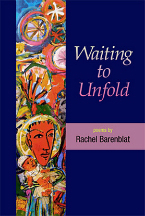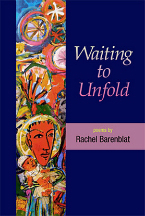Rachel Barenblat's Blog, page 190
May 6, 2013
Interview about Waiting to Unfold at Love, InshAllah
My thanks are due to the editors at Love, InshAllah who have published an interview with me along with some very kind words about Waiting to Unfold!
Love, InshAllah is the blog associated with the book by the same name, Love, InshAllah: the Secret Love Lives of Muslim Women, an excellent collection of essays which I am delighted to have on my bookshelf. Here's an excerpt from the interview, which just went live:
LA: In Waiting To Unfold, you write about pregnancy, the birth of your son, and parenting during that first year. One day, he will go back and read this. Do you envision this moment and his response?
RB: It’s strange and wonderful to think of our son someday being old enough to read these poems. I hope that when he reads them, he sees them as a labor of love — and I hope he sees that even when I was struggling with postpartum depression, my love for him was always present and always real.
The title comes from one of the poems in the book — “Belief,” which speaks about my belief in redemption: belief that spring would comes after that long winter, and that the antidepressants would restore to me the laughter and the sense of self I remembered from my life before. That phrase, waiting to unfold, felt to me like a metaphor for so many things: the embryo curled inside the uterus, a plant curled inside a seed, my heart...
You can read the whole piece here: The Poetry of Motherhood: Waiting to Unfold. Thank you, Love, InshAllah editors!
Waiting to Unfold costs $13.95 (US, CAN) / £9.10 / €10.66 and is available at Phoenicia Publishing and on Amazon (and Amazon UK and Amazon Europe) -- though publisher and author earn more if you buy it directly from Phoenicia. Still: buy it wherever works for you.
May 5, 2013
At an unveiling, a moment of grace
First I was distracted because I didn't have a cemetery map.
There's a custom in Jewish tradition of having an unveiling of the matzevah, the grave marker / headstone, usually a year after burial. I was privileged to do an unveiling this weekend -- my first, actually, so I'd spent some time in recent weeks reading up on the ceremony and how it evolved. I felt certain that I had put together good materials (including R' Brant Rosen's beautiful interpretation of Psalm 23). But I realized, when I woke this morning, that I wasn't exactly certain where in our cemetery I would find this headstone. I should have thought of it sooner, but I was so focused on the ritual that I forgot to think about the physical place in which the ritual would unfold. Grumbling at myself, I went to shul early to look for a cemetery map.
I thought I knew where such a map would be. I was wrong. And I had just finished my search for the map when my cellphone rang. It was my husband, calling to ask where his carseat was. I clapped my hand to my mouth, realizing all in a flash: oh, no, it was in my car, with me. I had driven away with both carseats. I'd had the spare one in the back of the car in case it was needed for our son's most recent playdate, and I'd forgotten to remove it. And by the time he called, I needed to dash to the cemetery to stroll the aisles in search of the headstone which needed to be dedicated. There was nothing I could do; he and our son would be stuck at home until I was done. I grumbled at myself some more.
When I arrived at the cemetery my distraction took a partial backseat to beauty. We're having a spectacular May weekend. All the trees are bursting into unbelievable chartreuse leaf. The grass at our cemetery is carpeted with tiny violets. I could hear a rooster crowing nearby. The horses stabled across the street whinnied and snorted. And, thank God, I found the headstone right away, and was able to drape it with a white linen cloth before the family arrived. Once people started arriving, I was able to focus on them; the morning's distractions and my exasperation with myself receded into a dull buzz at the back of my consciousness.
But what really shook me out of my distraction and brought me square into the present moment was the music. The daughter of the deceased stood before his stone and sang L'dor vador. "From generation to generation we shall tell of Your greatness..." Her voice was pure and quavered slightly. Time slowed down, and I could feel that moment as a pause, a pearl, strung in a string of moments stretching back to time immemorial and forward forever. The whole world seemed hushed and still, listening. The words come from the daily amidah prayer, and the song evokes our generations -- what connects us to our ancestors, and to our children -- the melodies, the heritage, the love which bind us to each other and to our tradition. By the time she had finished singing, my day was transformed.
It's those little moments of grace which make everything worthwhile. They can't be planned or presumed-upon; they come when they come. I don't know if she knew she was giving me such a gift, but she did. I am endlessly grateful.
The daughter who sang so gloriously was Gloria Lenhoff. She's the subject of the PBS documentary Bravo Gloria; you can hear her on YouTube, though not singing "L'dor Vador." For more: For woman with Williams Syndrome, music was the key.
May 4, 2013
Things I love about b'nei mitzvah
I love the excited buzz in the synagogue before Shabbat morning services when one of our kids is going to be called to the Torah as b'nei mitzvah.
I love the eager, nervous energy I feel emanating from the family. The parents, caught between the mundane organizational details they were worrying about yesterday and the growing awareness that today is something different, a different kind of time. The younger sibling, if there is one, rolling their eyes but also realizing that this is going to be them someday.
I love standing outside in the field behind our sanctuary, listening to the wild tapestry of birdsong, while the photographer adjusts: you put your arm around her, there, okay, turn a little bit this way, look at me, smile! The family always makes such a beautiful tableau, and I know they'll look at these photographs for the rest of their lives.
I love running through the Torah portion with the bat mitzvah girl one last time before services begin. Her voice is a little bit higher, her pace faster, today than ever before. By now I've practiced chanting this Torah portion with her so many times that I know it by heart, too.
I love the feeling of standing before the assembled community -- members of our congregation; our small core of Shabbat morning regulars; visiting family and friends -- and welcoming them into this place and this moment, this celebration of Shabbat and this celebration of a young person taking their place in our community.
I love inviting anyone who's never seen the inside of a Torah scroll up to the bimah, and unrolling it. Asking them to say, aloud, what makes it different from the books they usually read. It's in Hebrew; it's on parchment; it's a scroll; it's handwritten. Then I point out things they might not have noticed: there's no punctuation. There are no vowels. There are no musical notations.
I love seeing one of our kids shine. Hearing them read from Torah, and offer blessings, and teach something of what they've learned to the entire congregation.
I love hearing the blessing the parent(s) offer. Without fail, hearing the earnest words of love and pride they offer to their child is one of the most moving moments of my day, and reminds me of my own place in the chain of generations, between my parents and my son.
And I love chatting with people after the service, finding out what moved them and what spoke to them. It can be hard for me to gauge, when a lot of people have assembled who maybe aren't necessarily singing along, whether the service is reaching them. But every time, I hear from someone who didn't expect to be moved, or who didn't expect the service to be accessible, and was pleasantly surprised.
Mostly I love knowing that we've co-created a beautiful memory for the new young adult and for their family, and that our community is now one adult Jew richer.
Blessed are You, Adonai our God, source of all being, who has kept us alive, and sustained us, and enabled us to reach this moment.
May 3, 2013
Staying awake: Rabbi Ira Stone on Mussar
Why is it so difficult to do what is good? What is the relationship between living a religious life and an ethical one? How can religion fortify an ethical life? To these questions we will add one more: In a cultural milieu in which personal satisfaction and spiritual satisfaction are deemed synonymous, can we hope to attain an alternate spirituality that promises to take us beyond ourselves not through intoxication, but through profound concern for the other people among whom we live?
...The ultimate threat to the soul is sleep. Once the other has called us, once we have fallen in love, we are enjoined to a life of never-ending responsibility...Learning to stay awake is central to Mussar practice.
The quotation above comes from Rabbi Ira Stone, in his book A Responsible Life: The Spiritual Path of Mussar. Mussar is a system of Jewish ethics and practice aimed at helping us live righteously.
He begins by outlining the basic philosophy and theology of Mussar practice. Mussar assumes that we are conscious beings, each endowed with a yetzer ha-tov (the good impulse, or impulse toward goodness) and yetzer ha-ra (the evil impulse, or impulse toward wickedness.) Both are a necessary part of our humanity. Mussar practice is intended to help us cultivate our best qualities, in order that we might resist the yetzer ha-ra's inclinations to become "forgetful" (or, in Stone's words, to fall asleep -- to ignore our obligations to one another and to God) and instead strengthen the yetzer ha-tov in being "awake."
And how do we do this? Through cultivating middot, character traits or qualities, which align us with ethics and holiness. Working on our middot allows us to develop the twin spiritual faculties of awe of God (yirat Hashem) and love of God (ahavat Hashem.) As we develop those strengths, that in turn helps us orient ourselves toward our better impulses. With greater awe and love, we can more easily make ethical choices.
The ultimate goal is the transformation and healing of all of qualities and our impulses, from negative to positive. It's a tall order, but one that I find tremendously resonant with my sense of spiritual practice. The student of Mussar, writes Rabbi Stone, may feel as though the texts at hand tell them something they already knew. The point isn't merely taking in new information: it's studying the things which we know to be true and right, but which something in us perhaps resists.
This isn't merely dry academic study. Rabbi Stone cites Rav Yisrael Salanter, one of the great lights of Mussar, in his insistence that Mussar texts be studied "with lips aflame" -- in other words, aloud and with passion.
Rabbi Stone offers a fairly standard list of middot, qualities. As I read through them, some leap out at me because they are qualities I have tried to cultivate; others leap out at me because they are qualities which still challenge me. Here are a few:
Equanimity. Rise above events that are inconsequential -- both bad and good -- for they are not worth disturbing your equanimity.
Order. All of your actions and possessions should be orderly -- each and every one having a set place and a set time. Let your thoughts always be free to deal with that which lies ahead of you.
Diligence. Always find something to do -- for yourself or for a friend -- and do not allow a moment of your life to be wasted.
Silence. Before you open your mouth, be silent and reflect: "What benefit will my speech bring to me or to others?"
I've spent a lot of time, these last years, working on equanimity. And I know that I am happiest and most productive when my life is reasonably well-ordered. But I struggle sometimes with diligence and with silence. Sometimes I think I should be cultivating greater diligence, keeping busier, not wasting an instant of my precious life -- and other times I think: no, I'm only human, I've got a three-year-old, I need some downtime! Sometimes I think I should strive for greater silence, especially online where there's such a constant brouhaha of people gabbling -- and other times I think: no, today's world demands not that I remain silent but precisely that I speak.
And then I wonder: am I resisting a practice of improving my diligence because it's honestly healthy for me as a woman and a mother in 2013 to cut myself some slack? (Yes, almost certainly.) Or am I resisting it because I'm looking for an excuse to lose a few hours watching mediocre television and wittering around on the internet? (Yes to that too, I suspect.) Am I resisting a practice of silence because I genuinely have valuable Torah to offer to the world? (Yes, I think so.) Or am I resisting it because I'm not sufficiently spiritually-advanced to be able to sustain a practice of only speaking when my speech is really necessary? (Surely the answer to that question too is yes.)
Part of what moves me, in Rabbi Stone's writing, is the assertion that we need to remain awake and alert to our obligations because it is in these obligations to one another that we meet God. Mussar practice is a practice of self-refinement. As we refine our qualities, we become better-attuned to our love and our awe. Through love and awe, we become better able to perform mitzvot, to act with awareness that we are obligated to and for God and to and for each other. And that's how we cultivate true joy in our lives: not fleeting enjoyment, but real, deep joy. We cultivate joy through acting with mindfulness of the other, both the other beings with whom we share creation, and the ultimate Other who we understand as the source of all things.
More on this: Middot through text and practice, 2007.
May 2, 2013
Waiting to Unfold is part of the Ask Moxie Summer Readalong
I've been reading Ask Moxie for years -- certainly since our son was a newborn, if not before. I can't tell you how many times I turned to Moxie for calm, understanding wisdom and perspective when I was struggling during that first year. (Thank God for her archived posts about infants and sleep!) So I'm thoroughly chuffed to be able to announce that Waiting to Unfold is one of her picks for her summer readalong!
Here's what she says about the book:
May: Waiting To Unfold
by Rachel Barenblat. This book is two cycles, one of pregnancy, and one
of the first year after her child's birth. The poems have that same
"Oh! I'd forgotten about how beautiful/hard/sad/quiet/fierce that was"
quality that all true stories about the first year of parenthood do, and
made me laugh and tear up a little and feel nostalgic and sad for new
mothers everywhere. Rachel blogs at Velveteen Rabbi. Discussion post will go up May 29.
The other books she's chosen for the summer look fabulous too: Tulips, Water, Ash by Lisa Gluskin Stonestreet; American Sublime by Elizabeth Alexander; and Far From Luck by Charles O'Hay. I've just picked up all three, and look forward to discussing them with other Ask Moxie readers.
You can find her post about it here: Ask Moxie: Summer Readalong.
Thank you so much, Magda! For your fabulous parenting blog, and your work in the world, and for introducing your readers to my new book of motherhood poems.
Waiting to Unfold costs $13.95 (US, CAN) / £9.10 / €10.66 and is available at Phoenicia Publishing and on Amazon (and Amazon UK and Amazon Europe) -- though publisher and author earn more if you buy it directly from Phoenicia. Still: buy it wherever works for you, I'm just happy that people want to read it!
April Daily: a chapbook of 30 poems
 National Poetry (Writing) Month was fun this year. Over the course of April I wrote 30 poems: about parenthood, morning prayer, a rooftop New York city bar, a walk to the beaver dam, Iron Man and the golem of Prague, and more. The vast majority are poems I never would have written if I hadn't been doing the NaPoWriMo experiment this year.
National Poetry (Writing) Month was fun this year. Over the course of April I wrote 30 poems: about parenthood, morning prayer, a rooftop New York city bar, a walk to the beaver dam, Iron Man and the golem of Prague, and more. The vast majority are poems I never would have written if I hadn't been doing the NaPoWriMo experiment this year.
Earlyish in the month, my mother emailed me and asked if I could make all of the poems available to her in one file, easy to read, with the commentaries alongside -- maybe even in hard copy, something easy for her to thumb through? I said sure, I'd be happy to do that.
And then I realized that as long as I was making a single file with all 30 poems and all 30 commentaries, I might as well make it look pretty and make it available to anyone else who wants it, too. So I asked Twitter for help coming up with a chapbook title, and, well, here you go.
I feel a little bit silly sharing a new chapbook when I've just announced the release of a new book. Let me be clear: April Daily is the result of a month's worth of play; Waiting to Unfold is a real book, the product of years of work and hours of editorial back-and-forth!
So, y'know -- if you're just going to buy one, get the real book. Seriously. But if you're into daily poems, or if you participated in NaPoWriMo and you're curious to see what I did with the product of the month's work, or if you're just a completist, here it is. (And Mom, don't bother ordering a copy -- one's already on its way to you, just as I promised.)
April Daily: 30 poems in 30 days
$3.59
978-1484841402
April 2013
With deep thanks to 30/30 poetry and NaPoWriMo for the prompts. Here's to National Poetry Month!
April 29, 2013
Praise for Waiting to Unfold - from Beth Adams
Beth Adams, who is a dear and longtime friend and is also my publisher at Phoenicia, has shared an incredibly generous and gracious post about Waiting to Unfold on her blog The Cassandra Pages. Here's part of that post:
These are poems about pregnancy, birth and early parenthood, but again, she doesn't take the expected route. The poems, written as letters to her unborn son and then as a sort of poetic journal of the first year of his life, take an unflinching look at the difficulties as well as the joys of motherhood. I'm not a parent myself, but I've often observed that parents, and mothers especially, are under tremendous pressure to feel and to say that everything is rosy, even perfect, when in fact the experience is often quite mixed. A lot of women who give birth find themselves finally admitted to the secret club of motherhood, where it's almost as if they have to sign a pledge not to reveal the darker side.
Rachel had a miscarriage before she gave birth to her son; that experience and that unborn child are not forgotten, but woven into her poems about this subsequent pregnancy as he writes of her worries as well as her anticipation. And after the birth, she experiences and is treated for post-partum depression, eventually emerging from that cloud. The majority of the poems are celebratory, joyful, funny, and above all, honest. Like all of Rachel's work, I found them very accessible, and -- like the author herself -- imbued with a deep spirituality that's always present but never overbearing.
She also writes about how we met, and about other creative projects on which we've been blessed to collaborate. Read the whole thing: Waiting to Unfold at The Cassandra Pages.
Waiting to Unfold: $13.95 (US, CAN); £9.10 UK; €10.66 EUROPE. Buy it on Amazon, or at the publisher's website (author and publisher earn substantially more if you go through the Phoenicia page, but do what's best for you!)
Daily April poem: riffing off of a famous phrase
ETHICS OF THE MOTHERS
Ben Zoma said:
Who is wise?
One who learns from everyone,
as it is written: from all of my teachers
I gained understanding.
Who is happy?
One in pyjamas watching cartoons;
one who rejoices in the combination
of puddles and rain boots;
in trains of any dimension.
Who is frustrated?
One who yearns for a cookie
upon waking to the dawn
even though it is known
cookies are not a breakfast food.
Who is fortunate?
One who says thank you
for the trees, for the cars,
for the new Spiderman undies,
for the moon.
This poem grew out of a NaPoWriMo prompt which invited us to take the first few words of a famous saying, plug them into a search engine, and make a poem with what we found there. It's traditional to study Pirkei Avot -- "The Ethics of the Fathers," a compilation of rabbinic wisdom -- during the Counting the Omer, so I thought of the saying from Pirkei Avot (chapter 4, mishna 1) "Who is wise? One who learns from everyone, as it is written: from all who taught me, I gained understanding."
Anyway: today's poem arose out of that bit of Pirkei Avot. The first stanza is a direct quote from Ben Zoma; the other stanzas are my own invention. Consider it a fragment of Pirkei Imahot, the Ethics of the Mothers.
April 28, 2013
The perfect Mother's Day gift...
 The ever-reliable Mother's Day Central
The ever-reliable Mother's Day Central
tells me that in the United States, Mother's Day is May 12. Turns out
that's also true in a lot of other places, among them Belgium, Botswana,
Brazil, Canada, China, the Czech Republic, Ethiopia, Ghana, Hong Kong,
Iceland, India, Japan, Malaysia, New Zealand, the Philippines, Tanzania,
Turkey, Uganda, the Ukraine, Venezuela, Vietnam, and Zimbabwe. (There's
a full list of nations at that Mother's Day Central link, as well as a
list of other places and their dates. Paraguay and Poland both celebrate
Mother's Day later in May. In Mongolia, it's June 1. Belarus, not until
the fall. Things I never knew.)
If you're looking for a Mother's Day gift, kindly allow me to humbly suggest my new collection of poems, Waiting to Unfold. Of Waiting to Unfold, Naomi Shihab Nye says, "These rich poems will carry you into the great timeless miracle and mystery of unfolding littleness, nonstop maternal alertness, beauty and exhaustion and amazing, exquisite tenderness, oh yes."
Also, if you buy a copy, you'll be making my Mother's Day sweeter -- and in a way you're also giving a Mother's Day gift to my mom, because when my book reaches new readers, she gets to kvell too! (Okay, in all seriousness: more people buying this book will bring a smile both to my face and to my mom's, but I also think this collection of early-motherhood poems would be a meaningful Mother's Day gift for any mother, grandmother, or person who's played a maternal role in your life.)
The book costs a mere $13.95 (US, CAN); £9.10 (UK); €10.66 (Europe.) It's available on Amazon's various permutations, though I'd appreciate it if you'd consider purchasing it directly from Phoenicia's online store. Thanks for supporting independent publishing. (And if your mom digs the poems, please let me know!)
Happy Lag B'Omer! Two from the VR archives.
Today is the 33rd day of the Omer. Since Hebrew letters are also numbers, and the Hebrew number 33 is spelled לג, today is called Lag b'Omer. It's a minor holiday, with all sorts of fascinating stories and teachings attached to it. I don't have anything new to share for Lag b'Omer this year, but here are two Lag b'Omer posts from the archives:
Plagues? Rebellions? May Day? Lag B'Omer!, 2007. "In traditional Judaism, the counting of the Omer is a kind of semi-mourning period, and Lag b'Omer marks either an end to, or a pause in, the mourning. Some say we're mourning for the students of Rabbi Akiva, who were killed by a plague because they didn't treat one another with respect; the plague ended on the 33rd day of the Omer.
Some say that what it's really about is, Rabbi Akiva supported the Bar Kokhba revolt against Roman occupation. Many of his students followed him in supporting that revolt, and were killed. The so-called "plague" which ended on Lag b'Omer is a euphemism for the ill-fated rebellion...And here's another interpretation -- one I quite like: Lag b'Omer can be understood as a kind of Jewish May Day."
The bonfire of the expansive heart, 2009. "It interests me that these are the stories we tell about this minor holiday. Today is a day for remembering how important it is that we see the grace in one another, and honor one another's learning. It's a day to remember the dangers of following messianic figures into violent rebellion. And it's a day for celebrating illumination: not just the literal illumination of burning sticks and logs, but the metaphysical and spiritual illumination embodied in the wisdom of Torah and the Jewish mystical tradition.
In honor of that tradition, I want to offer a Hasidic teaching which relates to Lag B'Omer. It's about the importance of having a good heart..."
Happy Lag b'Omer! May we all strive to see the grace in each other, and may we cultivate good hearts filled with kindness, compassion, optimism, and joy.
Rachel Barenblat's Blog
- Rachel Barenblat's profile
- 6 followers








